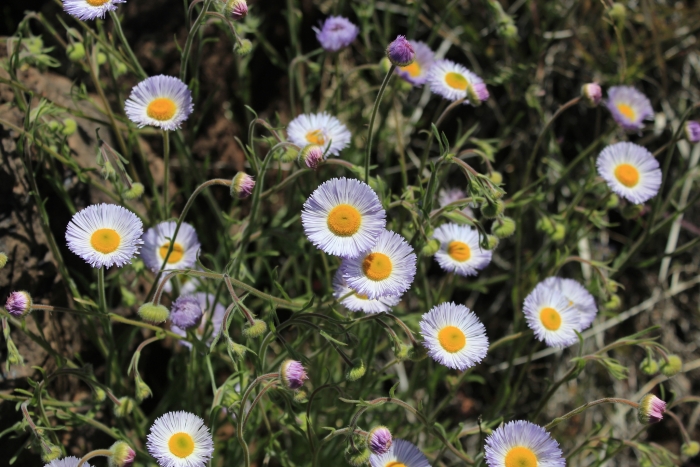Spreading Fleabane
(Erigeron divergens)
Spreading Fleabane (Erigeron divergens)
/
/

Paul McClellan
CC BY 4.0
Image By:
Paul McClellan
Recorded By:
Copyright:
CC BY 4.0
Copyright Notice:
Photo by: Paul McClellan | License Type: CC BY 4.0 | License URL: http://creativecommons.org/licenses/by/4.0/ | Rights Holder: Paul McClellan | Publisher: iNaturalist | Date Created: 2020-04-07T10:53:51-07:00 |














































































Estimated Native Range
Summary
Erigeron divergens, commonly known as Spreading Fleabane, is an annual or perennial herb native to a variety of habitats including open woodlands, dry plains, grasslands, and desert scrub in the Western USA and Northern Mexico. It exhibits high variability in form, growing from a taproot and sometimes a caudex, with stems ranging from 7 to 70 centimeters tall. The plant is covered in glandular hairs, particularly near the top of the stem. Basal leaves measure 1 to 7 centimeters in length, with progressively smaller leaves higher on the stem. The inflorescence is prolific, capable of holding over 100 flower heads. Each head features 75 to 150 white ray florets, no more than a centimeter long, which fade to purple, surrounding numerous yellow disc florets at the center. The fruit produced is about one millimeter long.
Spreading Fleabane is appreciated for its drought tolerance and adaptability to various soil types, making it a suitable choice for xeriscaping and naturalized areas. It thrives in full sun to part shade and requires minimal water once established, preferring soils with medium to fast drainage. Its abundant and long-lasting blooms make it an attractive addition to wildflower gardens, borders, and rock gardens. However, gardeners should be aware that it can self-seed prolifically and may become weedy in favorable conditions.CC BY-SA 4.0
Spreading Fleabane is appreciated for its drought tolerance and adaptability to various soil types, making it a suitable choice for xeriscaping and naturalized areas. It thrives in full sun to part shade and requires minimal water once established, preferring soils with medium to fast drainage. Its abundant and long-lasting blooms make it an attractive addition to wildflower gardens, borders, and rock gardens. However, gardeners should be aware that it can self-seed prolifically and may become weedy in favorable conditions.CC BY-SA 4.0
Plant Description
- Plant Type: Herb
- Height: 1-2 feet
- Width: 1-2 feet
- Growth Rate: Rapid
- Flower Color: White, Pink, Purple
- Flowering Season: Fall, Spring, Summer
- Leaf Retention: Deciduous
Growth Requirements
- Sun: Full Sun, Part Shade
- Water: Low
- Drainage: Medium, Fast
Common Uses
Bee Garden, Bird Garden, Butterfly Garden, Deer Resistant, Drought Tolerant, Groundcover, Low Maintenance, Rock Garden, Showy Flowers
Natural Habitat
Native to open woodlands, dry plains, grasslands, and desert scrub in the Western USA and Northern Mexico
Other Names
Common Names: Diffuse Fleabane, Vergerette Divergente
Scientific Names: , Erigeron divergens, Erigeron incomptus, Erigeron accedens, Erigeron divaricatus, Erigeron divergens var. divergens, Erigeron divergens f. incomptus, Erigeron solisaltator, Erigeron divergens f. divergens, Erigeron olo-mexicanus
GBIF Accepted Name: Erigeron divergens Torr. & A.Gray